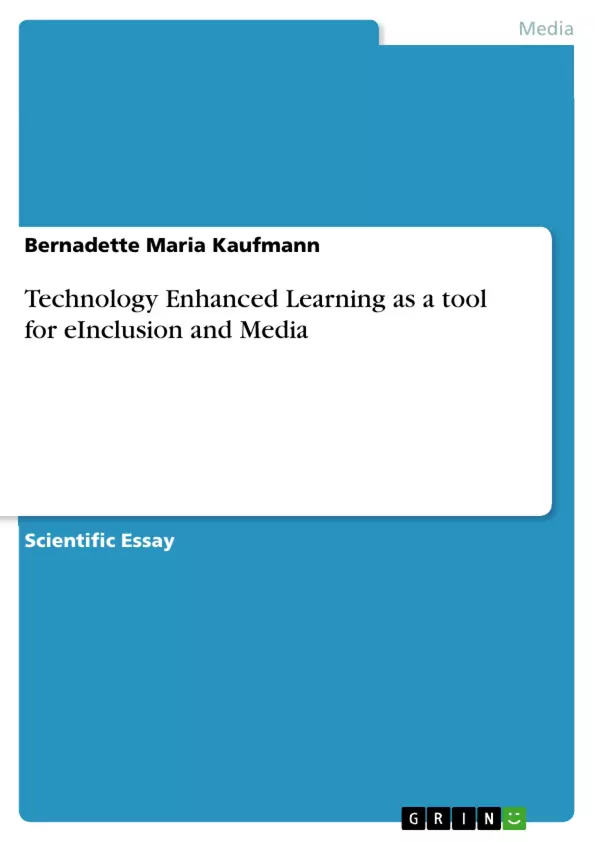Bernadette Maria Kaufmann
TEL as a tool for eInclusion and Media
Abstract
In this contribution I try to show off the importance of eInclusion out of two perspectives - the first perspective is taking a look at school:
Students from all social backgrounds must have the possibility of developing at least good competencies in ICT and the use of online-learning tools. Apart from that it’s important that the development of good media-competencies becomes part of the curriculum in schools. Schools should feel obliged to help students develop media-competencies as well as develop knowledge in maths, ethics or biology!
I start with the example of a student’s learning situation in a private school, then in contrast going on with illuminating most students’ situation in public schools. Both scenes are taken from Austria and seem comparable to the experience realm of most European students aged 6 to 18 years.
Then I consider a constructivist view of learning as an adequate pedagogic strategy for “new schools” that aim at helping students develop good competence in ICT and media perception.
Media have come to play an immanent role in our society.
We cannot ignore that students should learn how to make good use of media (online media as well as so-called traditional media like e.g. TV!) and become able to recognise chances and risks.
The second perspective is dealing with the inclusion of poverty as a topic.
The poor shall not remain “invisible” - as well as students from all social backgrounds should have the chance to get a good education, poverty should be a topic that’s presented in media in an authentic way.
Inhaltsverzeichnis (Table of Contents)
- Introduction
- CYBERHOMEWORK
- a student's learning situation in a private school
- ICT AND SCHOOLS
- CONSTRUCTIVISM
Zielsetzung und Themenschwerpunkte (Objectives and Key Themes)
This text explores the concept of eInclusion in the context of education, focusing on the gap between privileged students in private schools and those in public schools who lack access to technology and media skills. It argues for a constructivist approach to learning, highlighting the importance of technology integration in the classroom and the role of teachers in fostering media literacy.
- The importance of eInclusion and equal access to ICTs for all students.
- The disparities in educational opportunities between private and public schools.
- The significance of media literacy and critical thinking in today's knowledge-based society.
- The benefits of a constructivist approach to learning, emphasizing student agency and collaborative learning.
- The role of technology as a tool to enhance learning and foster student engagement.
Zusammenfassung der Kapitel (Chapter Summaries)
- Introduction: The introduction presents the two main perspectives of eInclusion discussed in the text: the need for all students to access and develop skills in ICT and media, and the inclusion of poverty as a critical topic for educational consideration.
- CYBERHOMEWORK: This section uses a case study of a private school student, Max, to demonstrate the positive impact of technology integration in learning. It highlights the contrast between the experiences of students in private and public schools, emphasizing the disadvantage faced by students without access to ICT at home and school.
- ICT AND SCHOOLS: This chapter delves into the research on ICT use in schools in Europe. It cites statistics from the EU Kids Online project, showcasing variations in internet access within schools across different European countries. The section emphasizes the need for schools to provide learning environments that foster media literacy and use ICT as a tool for engaging students.
- CONSTRUCTIVISM: This chapter explores the potential of constructivism as an effective pedagogical strategy for "new schools." It presents constructivism as a theory of learning that emphasizes active student engagement, interpretation, and critical thinking. The chapter includes an example of how a constructivist approach can transform a classroom into a collaborative learning space.
Schlüsselwörter (Keywords)
The primary keywords and focus topics of the text are eInclusion, digital knowledge, learning, Constructivism, media and society, private versus public education, access to ICTs, media literacy, and the role of technology in education.
Frequently Asked Questions
What is eInclusion in education?
eInclusion ensures that students from all social backgrounds have equal access to ICT (Information and Communication Technology) and the opportunity to develop digital competencies.
Why is Constructivism recommended for ICT learning?
Constructivism emphasizes active student engagement and collaborative learning, which helps students better understand and critically perceive modern media.
How do private and public schools differ regarding ICT?
The text highlights a gap where private school students often have better access to online learning tools, while public school students may lack these essential resources.
Should media literacy be part of the school curriculum?
Yes, the author argues that schools should be obligated to teach media competencies just as they teach math, ethics, or biology.
What is the role of poverty in media representation?
The second perspective of the study deals with making poverty "visible" in media in an authentic way to foster social inclusion.
- Quote paper
- Bernadette Maria Kaufmann (Author), 2010, Technology Enhanced Learning as a tool for eInclusion and Media, Munich, GRIN Verlag, https://www.grin.com/document/175943



